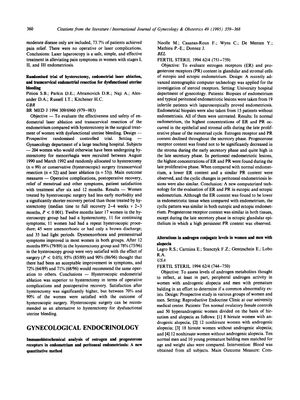Randomized Trial of Hysterectomy, Endometrial Laser Ablation, and Transcervical Endometrial Resection for Dysfunctional Uterine Bleeding
June 1995
in “
International Journal of Gynecology & Obstetrics
”

TLDR Hysteroscopic surgery is better than hysterectomy for treating dysfunctional uterine bleeding due to fewer complications and quicker recovery, with high satisfaction in both treatments.
In a study published in 1994, researchers evaluated the effectiveness and safety of endometrial laser ablation and transcervical resection of the endometrium compared with hysterectomy for the treatment of dysfunctional uterine bleeding. The study was a prospective randomized controlled trial involving 204 women who were recruited between August 1990 and March 1992. These women were randomly allocated to undergo hysterectomy (99 women) or conservative hysteroscopic surgery, which included transcervical resection (52 women) and laser ablation (53 women). The main outcomes measured were operative complications, postoperative recovery, relief of menstrual and other symptoms, and patient satisfaction after six and 12 months. The results showed that women treated by hysteroscopic surgery had less early morbidity and a significantly shorter recovery period than those treated by hysterectomy. After 12 months, 89% of the hysterectomy group and 78% of the hysteroscopy group were very satisfied with the surgery. Overall, hysteroscopic endometrial ablation was found to be superior to hysterectomy in terms of operative complications and postoperative recovery, and satisfaction rates were high for both groups, suggesting that hysteroscopic surgery can be recommended as an alternative to hysterectomy for dysfunctional uterine bleeding.
